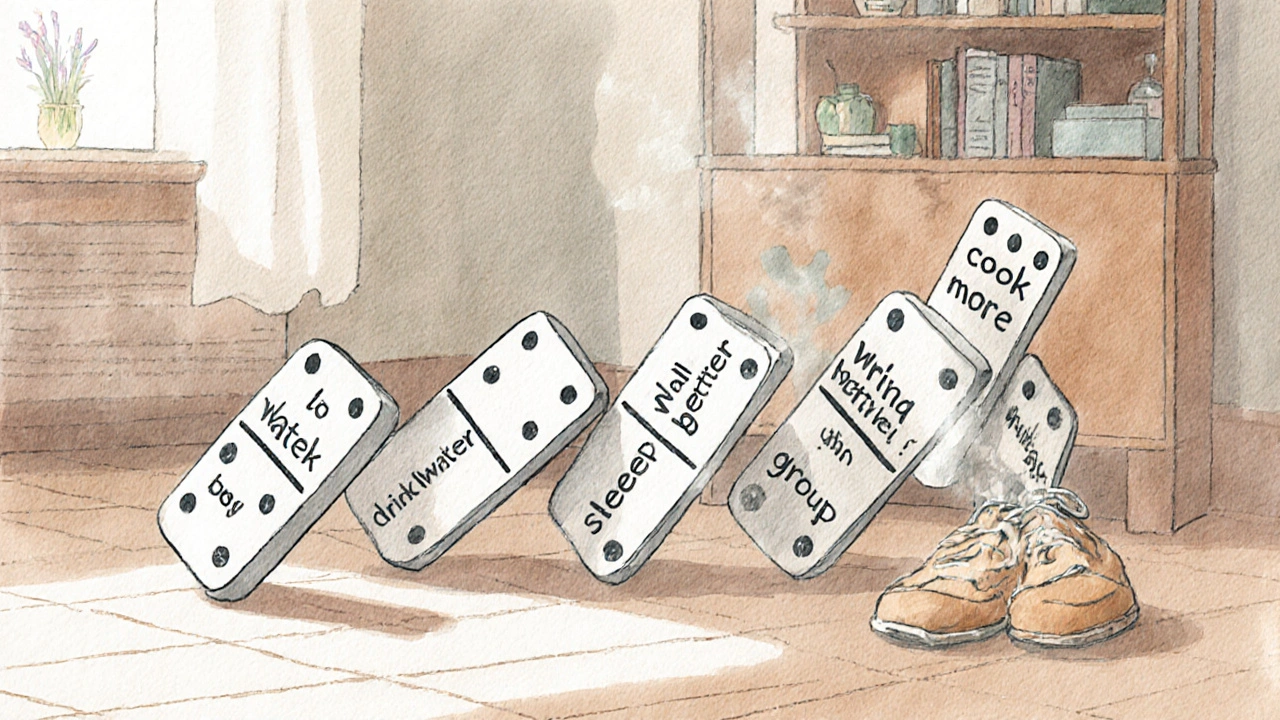Health Goal Builder
Create Your Sustainable Health Habit
Your SMART Goal
""
Most people think health goals are about losing weight or running a marathon. But real change starts long before the scale moves or your legs stop burning. It begins with small, quiet decisions-choosing water over soda, taking the stairs, sleeping seven hours instead of five. These aren’t grand gestures. They’re daily acts of self-respect. And over time, they rewrite your life in ways you didn’t expect.
Health Goals Don’t Just Change Your Body-They Change Your Mind
When you set a health goal, you’re not just training your body. You’re training your brain. Every time you stick to a goal-whether it’s walking 30 minutes a day or cutting out sugary snacks-you send a message to yourself: I can do this. That builds something deeper than muscle. It builds confidence. A study from the University of Sydney tracked 2,000 adults over 18 months who set simple health goals. Those who stuck with even one consistent habit reported a 40% increase in self-reported confidence and a 30% drop in anxiety symptoms.
It’s not magic. It’s neurology. Each small win releases dopamine, the brain’s reward chemical. Over weeks, that rewires your default thinking. Instead of thinking, I can’t stick to anything, you start thinking, I’ve done hard things before. That shift changes how you handle stress, how you talk to yourself, and even how you show up at work or in relationships.
Health Goals Create Ripple Effects You Can’t Predict
One woman in Melbourne started with a goal to drink more water. She swapped her afternoon soda for a glass of lemon water. Within three weeks, she stopped craving sweets. By month two, she began cooking more meals at home. By month four, she’d joined a local walking group. She didn’t set out to make friends or lose weight. But those things happened anyway.
This isn’t rare. When you improve one health habit, others follow like dominoes. Better sleep leads to better food choices. Regular movement reduces stress eating. Cutting back on alcohol improves focus, which makes it easier to plan meals or stick to a workout schedule. The changes stack. They don’t happen all at once, but they compound. That’s why people who set health goals often end up doing things they never thought possible-like quitting smoking, starting a business, or finally saying no to toxic relationships.

What Health Goals Actually Look Like (And What They Don’t)
Most goals fail because they’re too vague. “I want to be healthier” doesn’t work. Your brain doesn’t know what to do with that. Healthy goals are specific, measurable, and tied to your life.
- Bad: “I want to exercise more.”
- Good: “I’ll walk 20 minutes after dinner, Monday through Friday.”
- Bad: “I want to eat better.”
- Good: “I’ll pack a lunch with veggies and protein three times a week.”
- Bad: “I need to sleep more.”
- Good: “I’ll turn off screens one hour before bed and read instead.”
These aren’t just instructions-they’re commitments to yourself. And they’re designed to fit into your real life, not some ideal version of it. If you work nights, your “morning walk” becomes a “lunchtime stroll.” If you’re a parent, your “healthy lunch” might be leftover chicken and roasted sweet potatoes eaten cold at 8 p.m. That’s still a win.
Why Most People Give Up (And How to Avoid It)
The biggest reason health goals fall apart? People treat them like a sprint, not a journey. They go all-in for two weeks, then burn out. Or they wait for the “perfect time”-Monday, the new month, their birthday. But life doesn’t pause. Health isn’t a project with a finish line. It’s a practice.
Here’s what works instead:
- Start with one goal. Not three. Not five. One.
- Make it so easy you can’t say no. If you say you’ll do 30 minutes of yoga, you’ll quit. Say you’ll do five minutes. You’ll do it. Then you’ll do ten. Then twenty.
- Track it simply. A checkmark on a calendar is enough. No apps needed.
- Forgive slip-ups. Missed a day? So what. Just start again tomorrow. No guilt.
People who keep going aren’t the most disciplined. They’re the ones who stopped waiting to feel motivated. They acted anyway.

Your Health Goals Are a Reflection of Your Values
What’s underneath your health goal? Maybe you want to be strong enough to play with your kids. Maybe you want to travel without getting winded. Maybe you want to wake up without a headache or dread. Health goals are never really about the body. They’re about the life you want to live.
When you connect your goal to a deeper reason, it sticks. Instead of “I need to lose weight,” try: “I want to feel light and free so I can hike with my sister next summer.” That’s powerful. That’s personal. That’s why you’ll show up on the days you don’t feel like it.
And when you do? You’ll notice other things change too. You’ll speak up more at meetings. You’ll say no to things that drain you. You’ll smile more. Not because you’re thinner or faster-but because you’ve started believing in yourself again.
What Happens When You Stick With It
After six months of consistent health habits, people don’t just look different. They act different. They’re calmer. More patient. Less reactive. They sleep better. They laugh more. They stop apologizing for taking up space.
One man in Brisbane started with a goal to stand up every hour at his desk. He didn’t lose weight. He didn’t run a race. But he stopped getting migraines. He started noticing the birds outside his window. He began writing poetry again. He told his doctor, “I didn’t set out to feel alive. But that’s what happened.”
That’s the quiet power of health goals. They don’t promise perfection. They promise presence. They bring you back to your body, your breath, your rhythm. And in a world that’s always rushing, that’s the greatest gift of all.






